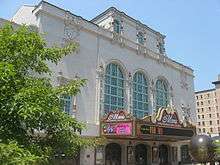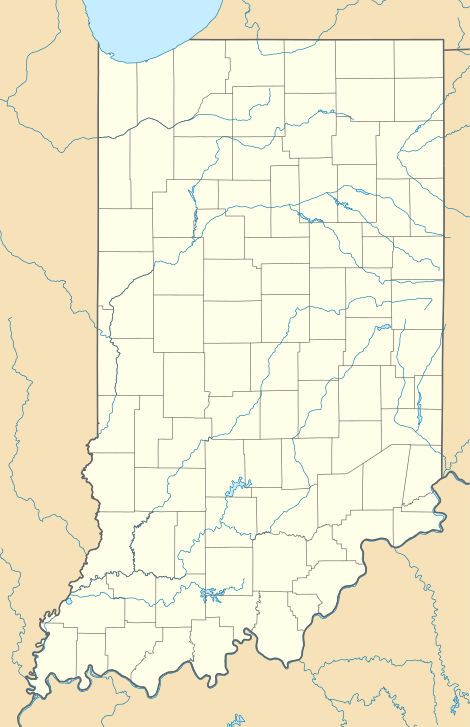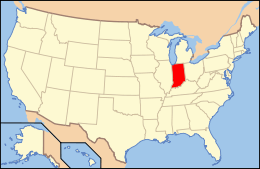Morris Performing Arts Center
Morris Performing Arts Center (originally Palace Theatre and formerly Morris Civic Auditorium) is a 2,564-seat concert hall located in South Bend, Indiana. It opened in 1922 as a vaudeville house and later became a movie palace. It was developed along with the neighboring Palais Royale Building by the Palace Theater Corporation. It is a four- to five-story, rectangular, Spanish Renaissance Revival style brick building with finely crafted terra cotta ornamentation. It was planned for demolition in 1959 but was saved from demolition, and between 1998 and 2000, it was restored and remodeled.[2]:51
 Front of the center | |

| |
| Former names | Palace Theatre Morris Civic Auditorium |
|---|---|
| Address | 211 N. Michigan St. South Bend, Indiana United States |
| Owner | City of South Bend |
| Operator | Morris Entertainment, Inc. |
| Type | Vaudeville house |
| Capacity | 2,564 |
| Current use | Performing arts center |
| Construction | |
| Opened | 1922 |
| Reopened | March 3, 2000 |
| Website | |
| www | |
Palace Theatre | |
  | |
| Coordinates | 41°40′42″N 86°15′2″W |
| Area | Less than 1 acre (0.40 ha) |
| Architect | J.S. Aroner; Ralph Sollitt Co. |
| Architectural style | Spanish Renaissance Revival |
| MPS | Downtown South Bend Historic MRA |
| NRHP reference No. | 85001226[1] |
| Added to NRHP | June 5, 1985 |
Today, Morris Performing Arts Center's interior features a rose, blue and cream color scheme, as it originally did when it opened. The theater's stage, which measures 56 feet by 57 feet and contains a red and gold main curtain, dates from the 2000 restoration. The theater is home to the South Bend Symphony Orchestra and also hosts Broadway shows, concerts, and other special events, including Marian High School's annual commencement ceremony. The theater's interior is notable for borrowing from European architectural styles.[3] More than half of the seats at Morris Performing Arts Center — 1,282 are in the balcony. The remainder of the seats are in the lower level.
In 1985, the center was listed on the National Register of Historic Places. It qualified for historic designation both because of its place in the area's history and because of its historically significant architecture.[1]
References
- "National Register Information System". National Register of Historic Places. National Park Service. July 9, 2010.
- "Indiana State Historic Architectural and Archaeological Research Database (SHAARD)" (Searchable database). Department of Natural Resources, Division of Historic Preservation and Archaeology. Retrieved 2016-06-01. Note: This includes Elizabeth A. Straw and Karen Kiemnec (January 1985). "National Register of Historic Places Inventory Nomination Form: Downtown South Bend Historic MRA" (PDF). Retrieved 2016-06-01.
- Official website

